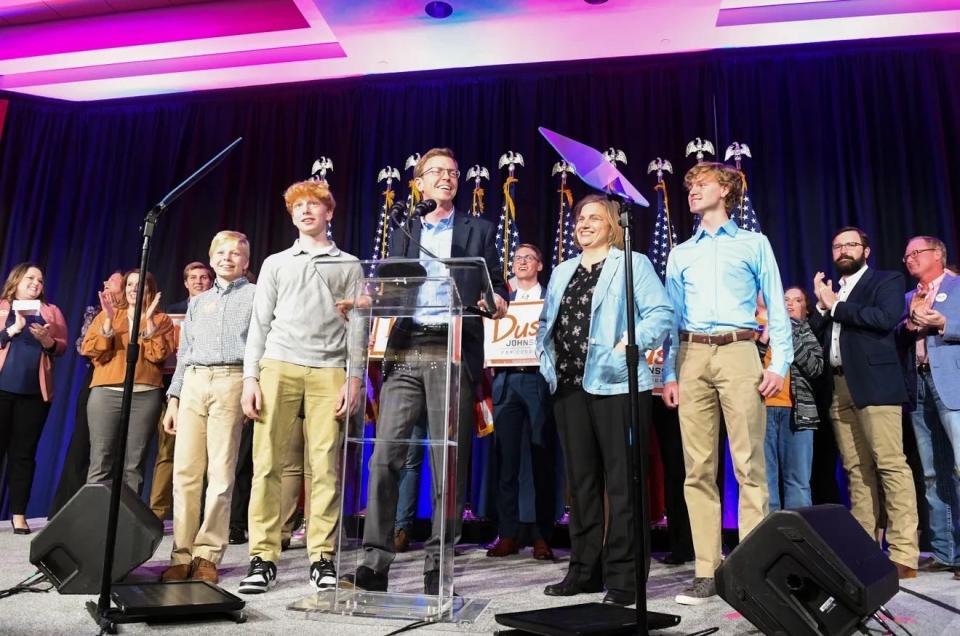Johnson’s political pedigree took shape in Pierre
- Oops!Something went wrong.Please try again later.
- Oops!Something went wrong.Please try again later.
- Oops!Something went wrong.Please try again later.
This is the first in a four-part series by South Dakota News Watch about the political journey and Republican Party challenges faced by U.S. Representative Dusty Johnson:
It makes sense to portray Dusty Johnson as a born politician.
He grew up in Pierre with a family legacy of lobbying and lawmaking and pushing the right buttons to make your voice heard. He immersed himself in the South Dakota Teenage Republicans the way some youth embrace the Boy Scouts, to avoid being lost in the wild.

His grandfather was Bill Johnson, a former broadcaster who turned to Republican politics in the 1960s and became an influential state lobbyist. Bill’s wife, Joan, was also active in the GOP ranks, attending several national conventions as a delegate, serving as party treasurer and working as an administrative clerk in the South Dakota Senate for nearly three decades.
Dusty spent a few afternoons with his grandmother roaming the halls of the state Capitol, across the street from his middle school. On Sundays, when his family attended church at Lutheran Memorial, it was not uncommon to see three or four state Supreme Court justices in nearby pews, solemnly absorbing the sermon.
But the narrative of an idyllic upbringing surrounded by constructive influences is not entirely whole, as Johnson acknowledges.
There were rough patches that helped mold his political temperament. His parents, Kevin and Jacque, struggled at times to provide for five children during what Dusty, the oldest, describes as a “hardscrabble” existence.
He started working at 14, washing cars at Capital Motors and manning the snack bar at Lariat Lanes bowling alley to be able to afford daily essentials such as socks and deodorant.
“It’s very easy to see that government exists when living in a state capital,” said Johnson, who was born in 1976, the year Democratic upstart Jimmy Carter won the White House in the wake of the Watergate scandal.
“Because of growing up poor, I was aware that there were safety-net programs out there. When I walked to the convenience store to get groceries for my family, it was not unusual to have to pay with food stamps. So I’ve always been fascinated about the question of what is the right role of government in people’s lives.”

Kevin worked as a hotel clerk and groundskeeper and Jacque is a social worker with the South Dakota Department of Social Services.
They started out as Republicans from conservative families and gradually became more liberal, finding daylight between their own beliefs and those that became keystones of their son’s political career.
“When you work in social services, you develop a different idea of how things should go,” said Jacque, who went from Teenage Republican as a high schooler to precinct captain for the South Dakota Democratic Party in Fort Pierre.
“We avoid discussing those matters (with Dusty) because it’s not worth fighting about. He knows that some of our core beliefs are different and we’re going to stand by them. But we also believe in getting along.”
Janklow’s leadership noticed in Johnson household
Johnson and his parents found common ground in their admiration for Bill Janklow, whose first stint as governor from 1979 to 1987 encompassed much of Johnson’s childhood.
They saw him as an effective leader who put public concerns ahead of his own, understood policy matters and worked to solve problems without regard to partisan interests. His ability to unite a politically fractured family was something that young Dusty took to heart.
Another source of agreement was that education was paramount.
Kevin and Jacque, neither of whom are college graduates, wanted to put their kids on a different path. That especially pertained to Dusty, the oldest, who entered a gifted program in elementary school. When the program was threatened by state budget shifts in 1988, when Dusty was 11, Jacque showed up at an Education Committee hearing at the Capitol with her son to testify against the change.
“I did a lousy job,” she told News Watch when asked of that day. “My voice quavered, and I shook, but I tried to make my points. Unbeknownst to me, Dusty had signed up while I was testifying, and he got up and testified in front of the committee and did a remarkable job.”
Teenage Republicans served as political proving ground
Johnson landed his first job at 14 and started a business at 16, buying out a local hobby-store owner for $4,000. It was a place for kids to play Dungeons and Dragons and other role-playing games.
He also wrote for the Riggs High School newspaper and ran track as a quarter-miler, convinced that “going out and running until you puke teaches you plenty of lessons.”
Dusty’s lean toward politics was encouraged by Alice Kundert, a former state auditor and secretary of state who served as adviser to South Dakota Teenage Republicans, a group that gathered in the Black Hills each summer for a camp to identify and inspire future leaders.
Dusty’s role as chairman of Teenage Republicans earned him a seat on the state GOP’s executive committee, a position he didn’t take lightly. Joel Rosenthal, the Republican Party chairman who became one of Johnson’s closest advisers, saw that they weren’t dealing with an average teen.
“He interacted well with adults, had a perspective of the party and made contributions to our efforts and discussions,” said Rosenthal. “He was easily distinguishable from Teenage Republican representatives that had previously served on our board.”
Head-to-head with Janklow over scholarship funds
Johnson had earned an all-expenses-paid Mickelson Scholarship to study political science at the University of South Dakota starting in 1995, fulfilling his parents’ vision in the only way the family could afford.
It was Janklow, revered for years in the Johnson household, who nearly stood in the way.
Budget cuts were looming, and the governor proposed cutting the Mickelson Scholarship grants, which were draining funds from an economic development program.
Johnson and a classmate skipped school and headed to the Capitol on a February morning to testify to legislators, a familiar trip for Dusty with an added sense of urgency.
“When you believe you have a full ride to the University of South Dakota, you don’t go hunting for other scholarships,” Johnson told the Senate Education Committee. “If I have a full ride, why go out and find another $10,000 that maybe somebody else could use?”
The high school senior later headed to Janklow’s office and requested a private meeting, exhibiting a blend of self-assuredness and naivete at which he still marvels.
“I mean, I know now that governors and congressmen are booked every 15 minutes for 12 hours a day and you don’t just get to parachute into their calendar,” Johnson said. “But I waited and I waited, and we ended up squaring off for a bit. He’s quick on his feet and sometimes I can be, and we went round and round on the issue.”
In the end, the scholarship program was cut but that year’s recipients were allowed to keep their grants, meaning Johnson would head to Vermillion with the understanding that politics are about negotiations and small triumphs, and tenacity is a handy tool.
This article was produced by South Dakota News Watch, a non-profit journalism organization located online at sdnewswatch.org.
This article originally appeared on Sioux Falls Argus Leader: Johnson’s political pedigree took shape in Pierre

